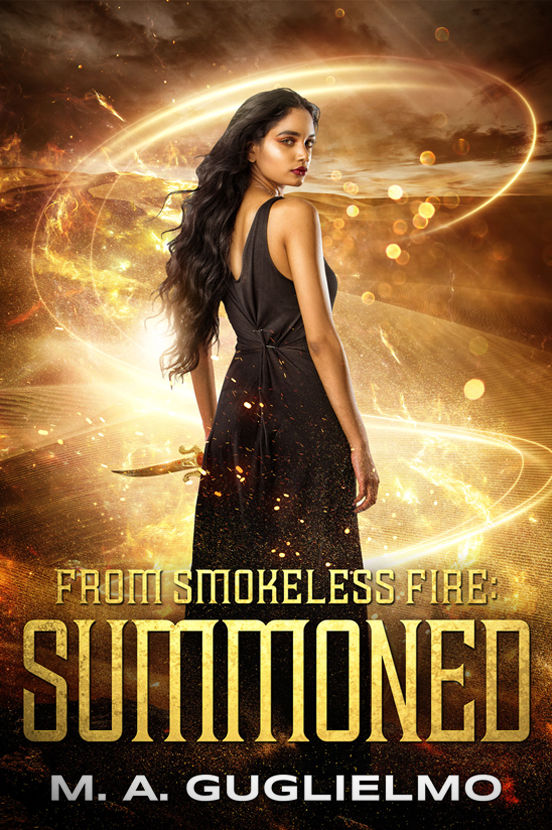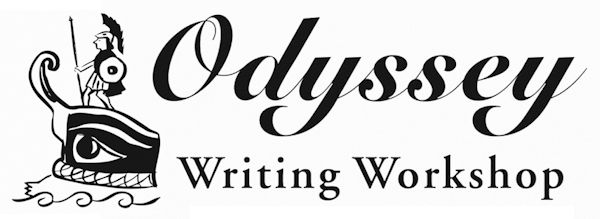 As a big fan of the Odyssey Writing Workshops podcasts, I was excited when the opportunity came up to interview one of their brilliant graduates, M. A. Guglielmo, on the release of her debut fantasy novel. Odyssey has been around for over twenty years now, helping writers of fantasy, science fiction and horror reach their potential. So, I couldn’t wait to find out a little more about Maria’s book and how the writing course helped her along the way.
As a big fan of the Odyssey Writing Workshops podcasts, I was excited when the opportunity came up to interview one of their brilliant graduates, M. A. Guglielmo, on the release of her debut fantasy novel. Odyssey has been around for over twenty years now, helping writers of fantasy, science fiction and horror reach their potential. So, I couldn’t wait to find out a little more about Maria’s book and how the writing course helped her along the way.
You’ve got a debut novel out, Summoned (with Tule Publishing). Congratulations! Can you tell us a little more about the story?
Summoned is set mostly in Marrakech and other sites in Morocco I’ve visited, and the story is loosely based on an Iranian story of two fallen angels—or perhaps jinn—who were sent to Earth to live as humans after mocking humanity for giving into temptation. Unfortunately, the two, Harut and Marut, fell into sin quickly, and were punished by being hung by their feet for eternity under Mt. Damavand, a dormant volcanic peak near Tehran. Summoned takes place in today’s world, after the two have been freed from a millennia of imprisonment, and the unlikely duo of a jinn diva who’s better at shopping than haunting, and a video game designer from a Jewish Moroccan background, have to stop them from wreaking havoc.
What was it that led you to Morocco for this particular story?
 I’ve been
interested in the politics and history of the area loosely referred to as the
Middle East for several years, and I’ve been drawn into some of the great
literature and stories from the region, like the tales in the adaptation we
know as A Thousand and One Arabian Nights,
and the great Persian verse epic The
Shahmaneh. I was directly inspired to write Summoned after visiting Morocco with my family. It’s a location
that has drawn travellers from the days of the great salt trade, to young
Western artists in the 1960s and on through today. Tourism is a huge industry
in Morocco, and it’s a beautiful and welcoming place to visit. But side by side
with refurnished riad hotels and a vibrant art and interior design scene are
tales of a different, unseen world, where intelligent beings—some benign, most
decidedly frightening—step out of their existence and cross into our own.
I’ve been
interested in the politics and history of the area loosely referred to as the
Middle East for several years, and I’ve been drawn into some of the great
literature and stories from the region, like the tales in the adaptation we
know as A Thousand and One Arabian Nights,
and the great Persian verse epic The
Shahmaneh. I was directly inspired to write Summoned after visiting Morocco with my family. It’s a location
that has drawn travellers from the days of the great salt trade, to young
Western artists in the 1960s and on through today. Tourism is a huge industry
in Morocco, and it’s a beautiful and welcoming place to visit. But side by side
with refurnished riad hotels and a vibrant art and interior design scene are
tales of a different, unseen world, where intelligent beings—some benign, most
decidedly frightening—step out of their existence and cross into our own.
The jinn—genies are the term many readers might be familiar with—aren’t wise-cracking, wish-giving creatures waiting in a bottle for a human to discover them. They have their own agenda and purposes, which can get pretty dark most of the time. Some of the legends of the jinn of Morocco were awfully scary—especially when told to me after midnight around a campfire in the desert!
You started this book as part of NaNoWriMo 2015. What was your journey like from that first draft until publication this year?
It wasn’t a quick process, that’s for sure! I went through several revisions of the novel and worked with different critique partners and writing classes. Since my characters come from different ethnic and religious backgrounds than my own, I also had sensitivity readers provide feedback on my manuscript. I queried agents and publishing houses, and then followed the common advice to keep working on other projects. A Facebook contest, of all things, led to an offer from Tule Publishing. If you think finally getting a contract means the end of revising that project—it’s doesn’t! I did more rounds of developmental and copy editing before Summoned came out on September 24th of this year.
Most writers try to write around their day jobs, which isn’t always easy. But you take this to the next level, being as you are a neurosurgeon! How do you balance such a stressful job in the medical profession with writing fantasy?
I often ask myself that very same question! I try to fit in my writing when I can, often at nights and on the weekends. The intellectual escape of writing fantasy as opposed to my clinical work and academic writing is refreshing and relaxing (at least until it comes back to the dreaded revision process).
I usually say what I write about couldn’t be farther away from neurosurgery, but the truth is I cringe every time I read a scene about head trauma that makes no medical sense at all. My critique partners know I’m totally picky about scenes involving medical topics. In the meantime, they help me with sword battles and magic systems. My advice to new writers is not to worry you won’t have anything to contribute. So many different occupational backgrounds and life experiences can help you give other authors valuable feedback.
You’re a graduate of the famous Odyssey Writing Workshops, specifically the online course. Can you tell us a bit about your experience with them?
I think Odyssey has an incredible reputation because of the time and effort they put into their educational courses, both the intensive summer program and their online offerings. There are a multitude of online writing classes out there, including some focused on speculative fiction. What sets Odyssey apart, in my opinion, is the focus and seriousness of the class members, as well as the supportive course instructors.

My class started off with a thorough analysis and discussion of how to give and accept criticism of your artistic work. It isn’t always easy to hear about what’s wrong with what you’ve written, and it’s not simple to help other writers fix problems in their writing, either. The focus at Odyssey is giving specific, truthful, and helpful assessments to critique partners, and keeping an open mind to the feedback you receive from them.
Writing workshops are big on collaborative work with other authors and I know you’re a fan of this approach. For all those introverted writers out there, what would you say to convince them of the value of collaborating with other writers?
I sometimes feel the expression ‘the scales fell from my eyes’, applies best to reading a good critique of a draft. After reading my own words over and over, I often lose the forest for the trees and miss key plot holes, or fail to show consistency in a character, or make some ridiculous mistake in an action scene. Other writers can help by giving a fresh take on the work and giving great direction on how to take the project to the next level. Unfortunately, although critique partners can do a wonderful job pointing out the issues in a section, it’s up to the writer to dig back in and do the hard work of figuring out how to fix it.
Odyssey is well known as being geared towards helping writers of fantasy, science fiction and horror improve their craft. How have you found these classes help you with your own fantasy writing?
 I’ve taken
classes in other genres, such as romance and literary fiction, and I think
there are both universal writing craft basics, and issues specific to certain
genres. In speculative fiction, the writer is often introducing readers to a
world that differs from our own in a unique way. Authors writing realistic
fiction often assume most readers have an immediate grasp of their settings,
whereas in speculative fiction worldbuilding has to be blended in with all of
the other critical components, such as character, dialogue and plotting.
Odyssey in particular helps writers by addressing worldbuilding issues, and by
giving literary examples from fields such as horror, science fiction and
fantasy.
I’ve taken
classes in other genres, such as romance and literary fiction, and I think
there are both universal writing craft basics, and issues specific to certain
genres. In speculative fiction, the writer is often introducing readers to a
world that differs from our own in a unique way. Authors writing realistic
fiction often assume most readers have an immediate grasp of their settings,
whereas in speculative fiction worldbuilding has to be blended in with all of
the other critical components, such as character, dialogue and plotting.
Odyssey in particular helps writers by addressing worldbuilding issues, and by
giving literary examples from fields such as horror, science fiction and
fantasy.
As a debut fantasy novelist, what lessons have you learned that you would pass on to other aspiring writers?
It’s old advice, but it’s true: read your work out loud to yourself during revision. So much more gets picked up with this simple trick. I also think educating yourself about the marketing and business aspects of publishing before you embark on putting your work out into the world is quite helpful. Having read so many articles about the process, it wasn’t a shock for me to find out how long it would take to get my novel from a messy first draft to the amazing sight of a beautiful book coming out of a shipping box and into my hands!
Thank you so much to Maria for taking the time to chat with us and to Odyssey for helping to arrange the interview!
You can learn more about Maria’s writing on her website and follow her on Facebook and Twitter!
For any writers out there interested in following in Maria’s footsteps to level up their spec fiction writing via the online Odyssey Writing Workshops, there are three online classes this winter. Each interactive class is designed to deepen your knowledge of the craft in a supportive yet challenging environment, so go check them out at Odyssey’s website. The application deadline is 7 December 2019. Enjoy!

